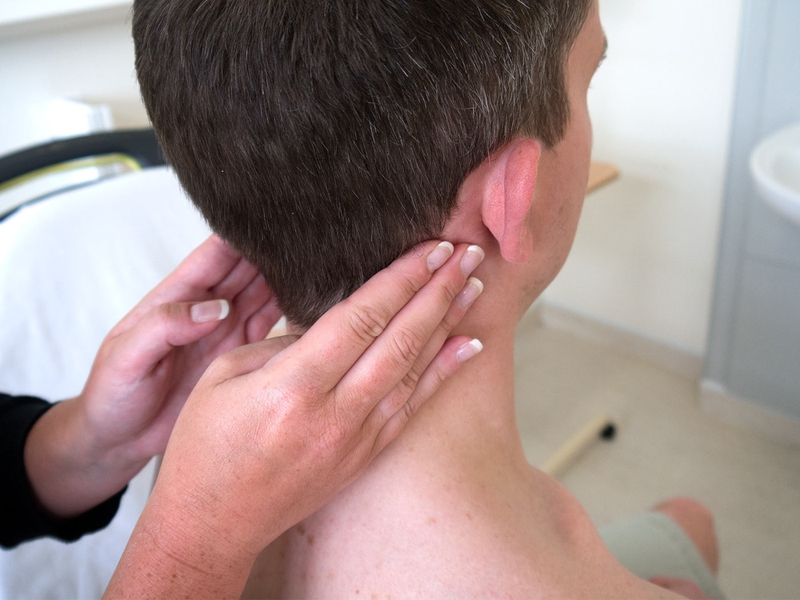Lymph nodes are part of the body’s immune system. Despite the relationship between the two being quite complex, they contribute to your body’s capability to fight infections. A lymph node or gland is simply a lump of tissue that is bean shaped and houses white blood cells. Lymph nodes are found throughout the entire human body either as a group or a single gland.
Each set of these glands is responsible for draining a specific part of the body. A group of lymph nodes

Why Do Lymph Nodes Behind Your Ear Swell?
Injury
If you hurt your neck, chances are that the lymph nodes behind the
Autoimmune Disease
Autoimmune diseases like lupus, Hashimoto’s disease among others can make your lymph nodes become uncomfortable or swell which is the result of your immune system being destroyed by the disease.
Cancer
Some types of cancer cause the lymph nodes to swell. This is mostly a sign of blood cancers and lymphoma that cause malignant cells to flow through the whole body. Once the swelling is trapped behind the ears, a growth or tumor might develop there, putting your body on high alert.
Infection
When you have a localized or systemic infection, your body fights it and, as a result, the lymph nodes tend to enlarge. This is due to the increased production of the antibodies so that your body can fight the infection agents. In case you have an upper respiratory infection (this includes the eyes as well as the scalp), the lymph node behind ear will swell. In addition, swollen lymph node behind ear might be a result of HIV/AIDS or fungal and parasitic infections.
German Measles
German measles are caused by the rubella virus. It causes a red or pink rash on your skin. The rash first develops on your face, then spreads down to the rest of your body. In addition to the rash, you might get swollen lymph nodes behind ear, at the base of your skull as well as your neck.
Tooth Abscess
Tooth abscess means that a
Other Causes
A cold and sore throat will cause lymph nodes behind your ear or the neck as well as at the base of your skull to swell.
If you get an allergic reaction to anything including drugs, chances are that lymph nodes behind your ear might swell alongside other symptoms.
Immune system disorders like Lupus and Rheumatoid arthritis
Certain medications like phenytoin (Dilantin), an anti-seizure medicine
Mononucleosis
Tuberculosis
Gingivitis
Tonsillitis
Sexually transmitted illness
Mouth sores
Associated Symptoms of Swollen Lymph Nodes
There are various symptoms that come along with swollen lymph nodes behind ear depending on the initial cause of the swelling. Nonetheless, below are some of the common symptoms that you might experience with swollen lymph nodes.
Tenderness and pain is experienced when pressure is applied to the glands.
High body temperature as a result of an infection.
Difficulty in swallowing food because of the swollen glands.
Warmth and redness where the lymph nodes are swollen.
If the swelling is a result of an infection in the upper respiratory tract, you might experience a running nose and sore throat.
When to Worry About It
If the lymph nodes behind your ears are swollen, it does not necessary mean that you have a serious ailment. In some cases, your body might be able to fight the infection that is creeping into your body. However, if you notice the signs below, you should get worried and see a doctor:
If the swollen glands do not decrease in size after a few weeks or they continue to grow larger.
If they are painful and tender.
If they are hard, irregular and in a fixed position.
If you experience high body temperatures as well as night sweats and unexplainable weight loss.
If you notice that the lymph nodes behind the
ear of your child are more than 1 cm in diameter.
How Is Swollen Lymph Nodes Behind Ear Treated?
Medical Treatments
In order to have accurate results, the medical practitioner must conduct a physical exam on the swollen glands. He will examine the texture and the size of the swollen glands. In some cases, the patient might be sent for an x-ray.
Treatment is dependent on the cause of the swelling of the lymph nodes.
If it is discovered that the actual cause is a bacterial infection, a round of antibiotics will be prescribed.
Should the infection be severe, IV antibiotics will be administered.
If the cause of the swelling is an allergic reaction, antihistamines and anti-inflammatory medications will be given to the patient.
If the glands are painful, painkillers will be administered as well.
Home Remedies
A warm and wet compress with washcloth can be applied to the swollen area for pain relief.
OTC painkillers like ibuprofen, aspirin and acetaminophen can help to manage the pain and fever, if there is. However, before you give aspirin to your child, do check with your doctor first as it might be associated with Reye's syndrome.
Whatever the condition is, you're going to need some rest for it to take a full recovery.
With the penetrating and treating properties of castor oil, it can be helpful to gently massage the oil to the swollen area.
Daily consumption of apple cider vinegar can be beneficial for fighting fungus and bacteria.

View All Comments /Add Comment